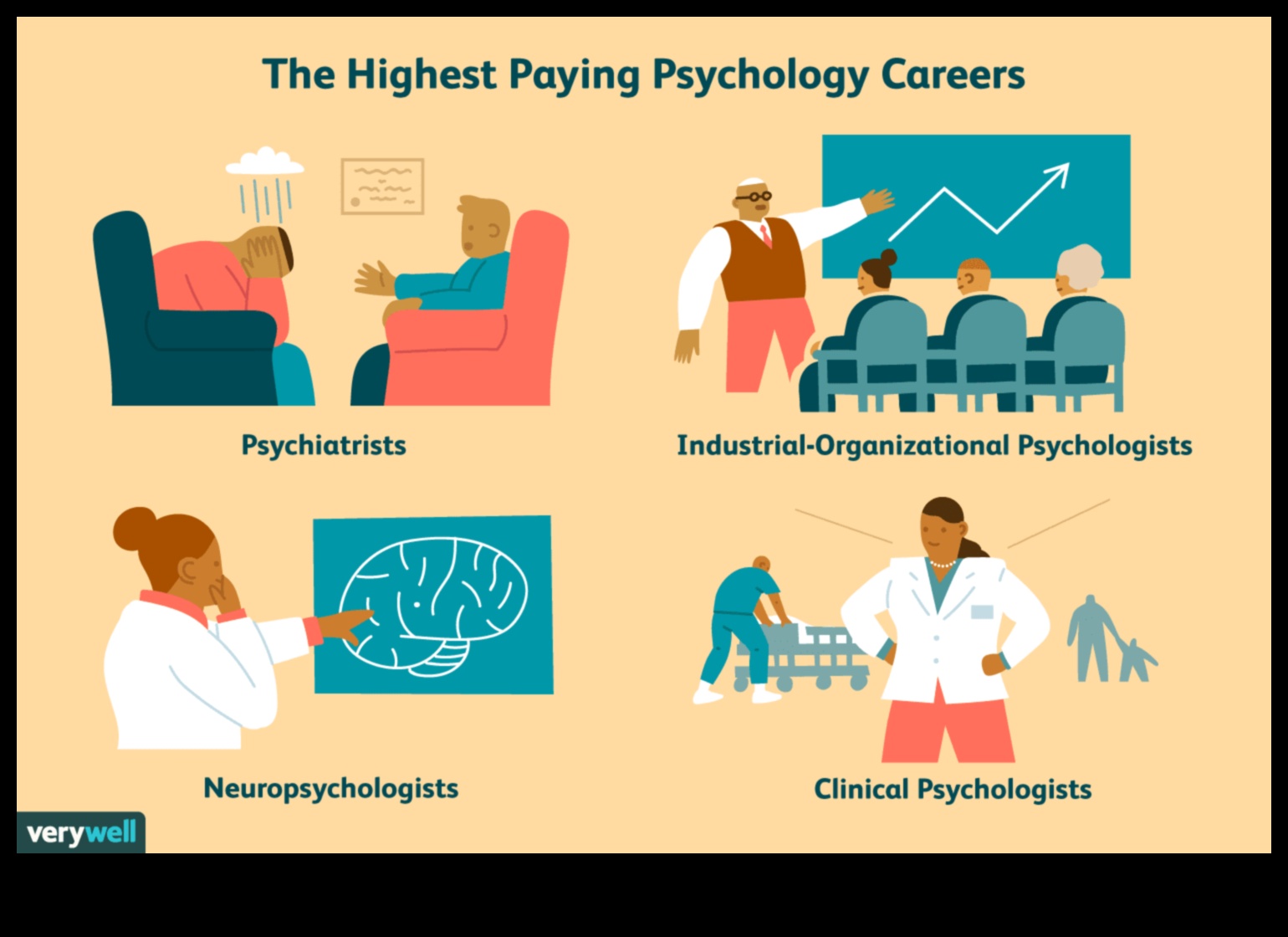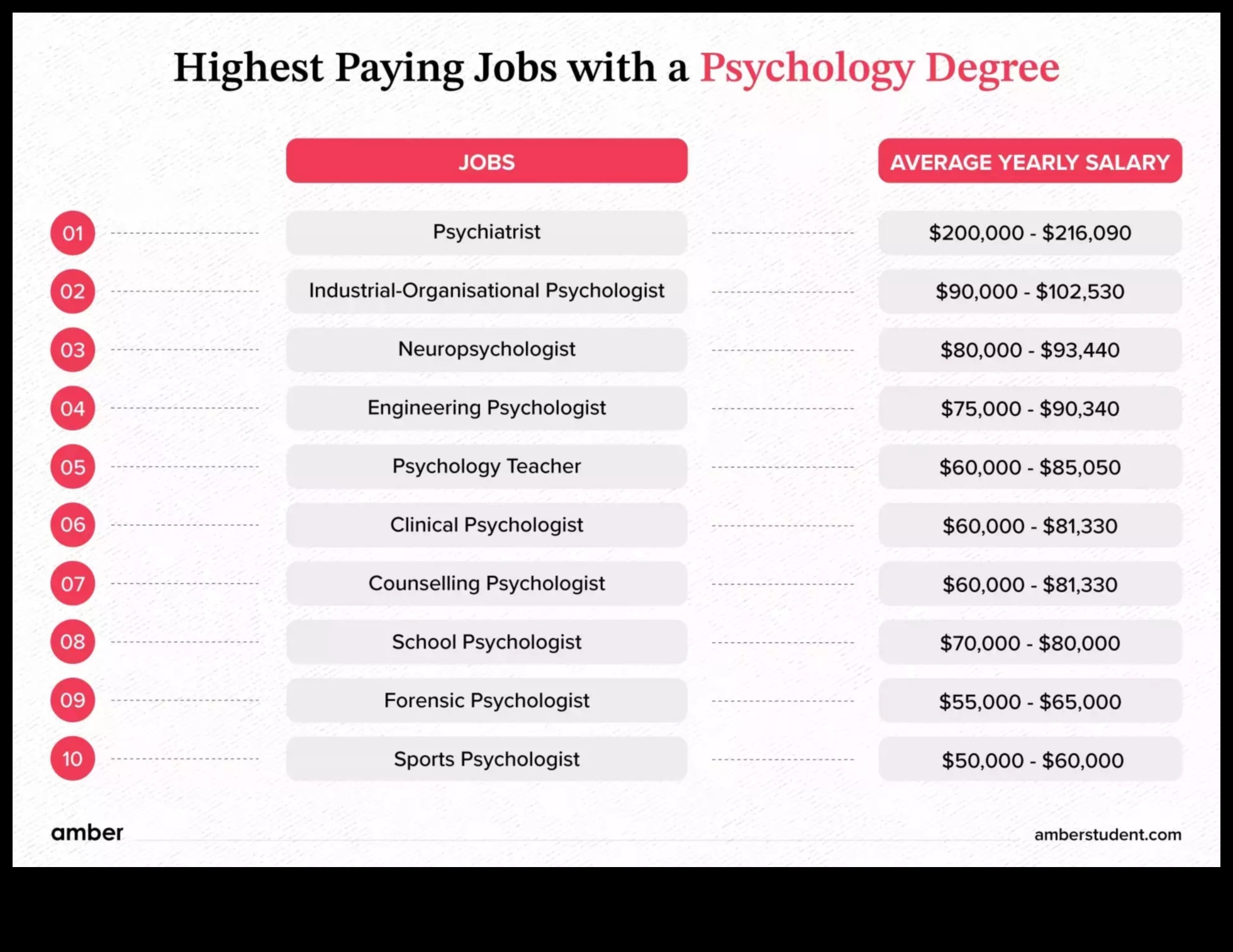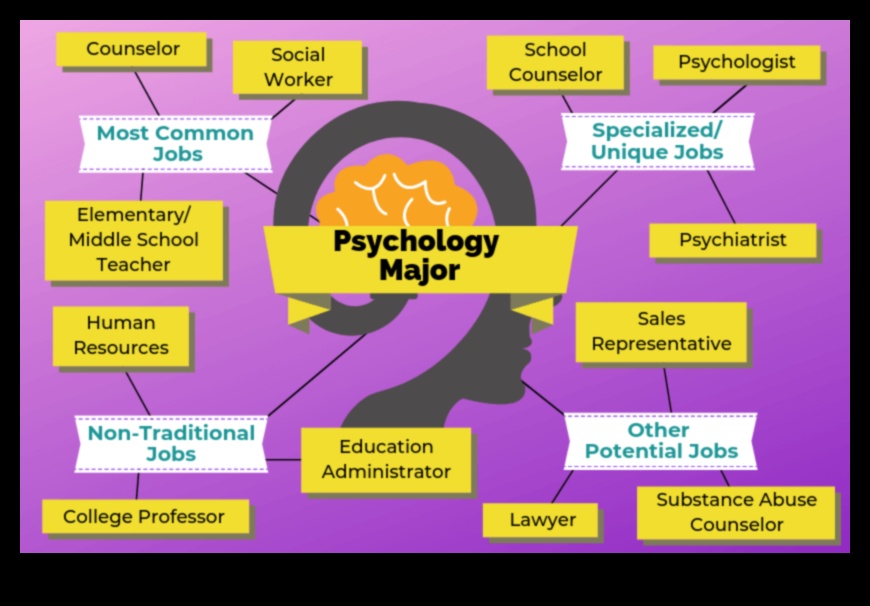
I. Psychology Minor Jobs
A psychology minor is a concentration of coursework in the field of psychology that is completed in addition to a student’s major. Psychology minors can choose from a variety of courses, such as social psychology, cognitive psychology, and developmental psychology. A psychology minor can be a great way to supplement a student’s major and gain a deeper understanding of the human mind.

II. Careers with a Psychology Minor
There are many different careers that are available to psychology minors. Some of the most popular careers include:
- Mental health counselor
- Social worker
- School psychologist
- Marketing researcher
- Human resources manager
III. Jobs for Psychology Majors
The following is a list of jobs that are specifically for psychology majors:
- Clinical psychologist
- Industrial-organizational psychologist
- Educational psychologist
- Forensic psychologist
- Sports psychologist
IV. What Can You Do with a Psychology Minor
A psychology minor can open up a wide range of career opportunities. With a psychology minor, you can pursue a career in mental health, social work, education, marketing, or human resources. You can also use your psychology minor to supplement your major in another field, such as business or law.
V. Careers in Psychology
The field of psychology offers a wide range of career opportunities. Some of the most popular careers in psychology include:
- Mental health counselor
- Social worker
- School psychologist
- Marketing researcher
- Human resources manager
These are just a few of the many careers that are available to psychology majors. With a psychology degree, you can pursue a career in just about any field you want.
VI. How to Get a Psychology Minor
To get a psychology minor, you will need to complete a certain number of credits in psychology courses. The number of credits required will vary depending on the college or university you attend. You will also need to meet the requirements for your major.
Once you have met the requirements for your major and minor, you will be awarded a psychology minor.
There are many benefits to having a psychology minor. Some of the benefits include:
- A deeper understanding of the human mind
- More career opportunities
- A competitive edge in the job market
- A better understanding of yourself and others
There are few disadvantages to having a psychology minor. Some of the disadvantages include:
- More coursework
- More time and money
- Not all employers value psychology minors
A psychology minor can be a great way to supplement your major and gain a deeper understanding of the human mind. With a psychology minor, you can pursue a wide range of careers in mental health, social work, education, marketing, and human resources.
Q: What is the difference between a psychology minor and a psychology major?
A: A psychology minor is a concentration of coursework in the field of psychology that is completed in addition to a student’s major. A psychology major, on the other hand, is a degree program that focuses on the study of psychology.
Q: What are the requirements for a psychology minor?
The requirements for a psychology minor will vary depending on the college or university you attend. However, most colleges and universities require students to complete a certain number of credits in psychology courses.
| Topic | Answer |
|---|---|
| Psychology Minor Jobs | A psychology minor can prepare you for a variety of careers in the human services, business, and education fields. Some common jobs for psychology minors include: |
| Careers with a Psychology Minor | With a psychology minor, you can pursue a wide range of careers in the following fields: |
| Jobs for Psychology Majors | Psychology majors can find jobs in a variety of fields, including: |
| What Can You Do with a Psychology Minor | With a psychology minor, you can pursue a variety of careers in the following fields: |
| Careers in Psychology | There are many different careers in psychology, including: |
II. Careers with a Psychology Minor
A psychology minor can be a great way to supplement your studies in another field and prepare for a career in a variety of fields. Here are some of the most popular careers for psychology minors:
Mental health counselor. Mental health counselors provide therapy and counseling to individuals, couples, and families. They help people with a variety of mental health issues, such as depression, anxiety, and addiction.
Social worker. Social workers help people who are struggling with a variety of issues, such as poverty, homelessness, and child abuse. They provide counseling, support, and advocacy to help people improve their lives.
School psychologist. School psychologists work with children and adolescents to help them learn and develop. They assess children’s academic and emotional needs, and provide counseling and support to help them reach their full potential.
Rehabilitation counselor. Rehabilitation counselors help people who have disabilities or injuries to regain their independence. They provide counseling, support, and assistance with job training and placement.
Marketing research analyst. Marketing research analysts gather and analyze data to help companies understand their customers and make better marketing decisions. They use psychology to understand how people make decisions, and how to influence those decisions.
Human resources manager. Human resources managers oversee the hiring, firing, and training of employees. They use psychology to understand how people work and how to create a positive work environment.
Sales representative. Sales representatives sell products and services to customers. They use psychology to understand what motivates people to buy, and how to sell them products and services that they want.
Teacher. Teachers use psychology to understand how children learn and develop. They use this knowledge to create engaging lessons and help children reach their full potential.
These are just a few of the many careers that are available to psychology minors. With a psychology minor, you can prepare for a career in a variety of fields that are focused on helping people.

III. Jobs for Psychology Majors
There are many different jobs that are available to psychology majors. Some of the most common jobs include:
Clinical psychologist: Clinical psychologists diagnose and treat mental health disorders. They work with clients in a variety of settings, including private practice, hospitals, and clinics.
School psychologist: School psychologists work with children and adolescents in school settings. They help students who are struggling with academic, behavioral, or social problems.
Counselor: Counselors help people with a variety of personal and professional issues. They work with clients in a variety of settings, including private practice, hospitals, and schools.
Research psychologist: Research psychologists conduct research on a variety of psychological topics. They work in universities, research institutes, and government agencies.
Marketing research analyst: Marketing research analysts use psychological principles to help companies understand their customers. They work in a variety of industries, including retail, finance, and healthcare.
Human resources manager: Human resources managers are responsible for hiring, training, and developing employees. They work in a variety of organizations, including corporations, government agencies, and nonprofits.
Social worker: Social workers help people who are struggling with a variety of social problems. They work with clients in a variety of settings, including private practice, hospitals, and community agencies.
These are just a few of the many jobs that are available to psychology majors. With a psychology degree, you can pursue a career in a variety of fields.

IV. What Can You Do with a Psychology Minor
A psychology minor can open up a wide range of career opportunities. Here are just a few of the jobs that you can get with a psychology minor:
- Clinical psychologist
- Counselor
- Social worker
- Teacher
- Market researcher
- Human resources manager
- Sales representative
- Event planner
- Public relations specialist
The specific jobs that you qualify for will depend on your individual skills and interests. However, a psychology minor can provide you with the foundation you need for a successful career in any of these fields.

V. Careers in Psychology
There are many different careers in psychology, each with its own unique set of requirements and opportunities. Some of the most common careers in psychology include:
- Clinical psychologist
- Counselor
- School psychologist
- Industrial-organizational psychologist
- Forensic psychologist
- Social psychologist
- Health psychologist
- Sports psychologist
- Research psychologist
The salary potential for psychology careers varies depending on the specific job title, level of education, and years of experience. However, psychology majors can expect to earn a median annual salary of $68,680, according to the Bureau of Labor Statistics.
To learn more about specific careers in psychology, you can visit the following websites:
VI. How to Get a Psychology Minor
To get a psychology minor, you will need to complete the following steps:
-
Meet with your academic advisor to discuss your plans to minor in psychology. Your advisor can help you create a course plan that will meet the requirements for the minor.
-
Complete the required courses for the psychology minor. The number of courses required for a psychology minor varies from school to school. However, most programs require students to take at least three courses in psychology.
-
Maintain a high GPA. Most schools require students to maintain a minimum GPA in order to earn a minor.
-
Submit a minor declaration form. Once you have completed all of the requirements for the psychology minor, you will need to submit a minor declaration form to your school’s registrar.
Once you have completed all of the steps above, you will be awarded a psychology minor. A psychology minor can be a valuable addition to your resume and can help you prepare for a career in psychology or a related field.
VII. The Benefits of a Psychology Minor
There are many benefits to pursuing a psychology minor, including:
- A better understanding of human behavior
- Improved critical thinking skills
- Enhanced problem-solving skills
- Increased communication skills
- Greater career opportunities
A psychology minor can help you develop a deeper understanding of human behavior, which can be beneficial in a variety of careers. For example, if you are interested in a career in law, a psychology minor can help you understand the motivations of criminals and victims. If you are interested in a career in business, a psychology minor can help you understand the behavior of consumers and employees.
In addition to developing a better understanding of human behavior, a psychology minor can also help you improve your critical thinking skills. Psychology courses require you to analyze and evaluate information, which can help you develop strong critical thinking skills. These skills can be beneficial in any career, as they allow you to make sound decisions and solve problems effectively.
A psychology minor can also help you improve your problem-solving skills. Psychology courses teach you how to identify and solve problems, which can be beneficial in a variety of careers. For example, if you are interested in a career in healthcare, a psychology minor can help you develop the skills you need to diagnose and treat patients.
A psychology minor can also help you improve your communication skills. Psychology courses require you to communicate effectively with both your peers and your professors. This can help you develop strong communication skills, which can be beneficial in any career. For example, if you are interested in a career in sales, a psychology minor can help you develop the skills you need to communicate effectively with customers.
Finally, a psychology minor can help you increase your career opportunities. A psychology minor can give you a competitive edge in the job market, as it shows employers that you have a strong understanding of human behavior. This can make you a more attractive candidate for a variety of jobs, including jobs in law, business, healthcare, and sales.
Disadvantages of a Psychology Minor
While a psychology minor can be a great way to supplement your studies in another field, there are also some disadvantages to consider.
First, a psychology minor can be time-consuming. If you’re already taking a full course load, adding a psychology minor can add even more stress to your schedule.
Second, a psychology minor can be expensive. In addition to the cost of tuition and fees, you may also need to pay for books and supplies.
Third, a psychology minor may not be as marketable as other minors. Some employers may not see the value of a psychology minor, especially if you’re not planning on pursuing a career in psychology.
Finally, a psychology minor may not be as challenging as other minors. If you’re looking for a minor that will challenge you intellectually, a psychology minor may not be the best choice.
Overall, a psychology minor can be a great way to learn about psychology and how it can apply to other fields. However, it’s important to weigh the pros and cons before you decide if a psychology minor is right for you.
A psychology minor can be a valuable addition to your resume, as it can help you develop the skills and knowledge you need for a variety of careers. By choosing a psychology minor that is aligned with your interests and career goals, you can increase your chances of finding a rewarding and fulfilling job.
If you are considering a psychology minor, be sure to do your research and choose a program that is accredited by the American Psychological Association (APA). This will ensure that you receive a high-quality education that meets the standards of the profession.
With a psychology minor, you can open up a world of possibilities for your future career. So what are you waiting for? Start exploring your options today!
FAQ
Q: What are the different types of jobs that are available to psychology minors?
A: There are a variety of jobs that are available to psychology minors, including:
* Clinical psychologist
* Counseling psychologist
* Industrial-organizational psychologist
* School psychologist
* Social psychologist
* Forensic psychologist
* Research psychologist
* Marketing psychologist
* Human resources specialist
* Teacher
* Counselor
* Social worker
* Therapist
Q: What is the salary potential of psychology minor jobs?
A: The salary potential of psychology minor jobs varies depending on the type of job and the level of experience. However, according to the Bureau of Labor Statistics, the median annual salary for psychologists is $82,180.
Q: What are the educational requirements for psychology minor jobs?
A: The educational requirements for psychology minor jobs vary depending on the type of job. However, most psychology minor jobs require a bachelor’s degree in psychology. Some jobs may also require a master’s degree or a doctorate degree.